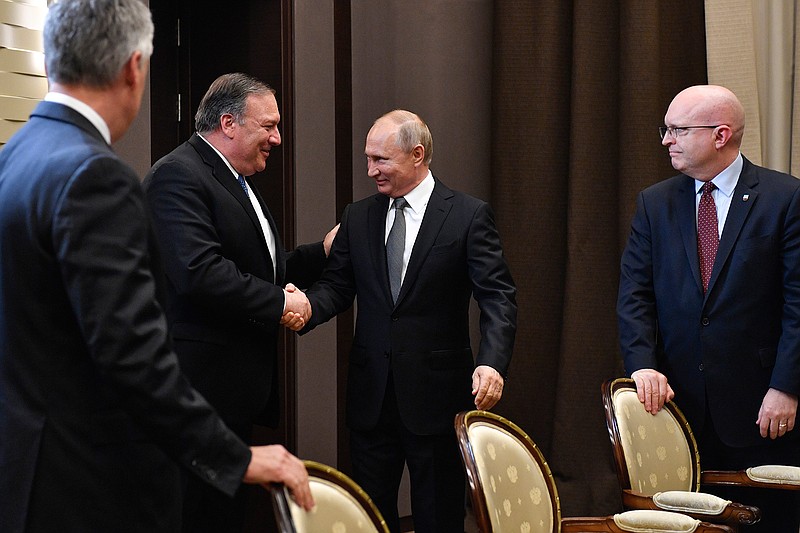SOCHI, Russia-Russia and the United States voiced hope Tuesday that badly strained relations could begin to improve despite wide differences on multiple fronts and deep mutual suspicion deepened by Russian meddling in American elections.
With tensions running high over Iran, Syria, Ukraine and Venezuela, Russian President Vladimir Putin claimed vindication from the investigation into Russia's interference in the 2016 U.S. presidential election and said he thought it was time to move on. Meanwhile, Secretary of State Mike Pompeo conveyed President Donald Trump's interest in restoring better ties.
In the highest-level face-to-face contact between the two countries since special counsel Robert Mueller's report was released last month, Putin told Pompeo he hoped relations with the U.S. would now improve.
Still, his claim of vindication covered only allegations that Russia and the Trump campaign colluded to hurt Hillary Clinton's candidacy. Putin did not address Mueller's conclusion that Russia actively interfered in the election.
"However exotic the work of special counsel Mueller was, I have to say that on the whole he has had a very objective investigation and he confirmed that there were no traces whatsoever of collusion between Russia and the incumbent administration, which we said was absolutely fake," Putin said as he opened the meeting with Pompeo in the Black Sea resort of Sochi.
"As we said before there was no collusion from our government officials and it could not be there. Still, that was one of the reasons for the certain break in our inter-state ties," he said. "I'm hoping today that the situation is changing."
Though Putin said the Mueller report did not find collusion, the report explicitly notes that collusion is not a legal term and that prosecutors instead searched for evidence of a criminal conspiracy between the Trump campaign and Russia. Mueller's team ultimately concluded that the evidence did not establish such a conspiracy.
Pompeo did not specifically mention election meddling in his brief reply to Putin, although he did say the Trump administration would "protect our nation's interest." Earlier, though, Pompeo made clear that any repeat of the 2016 meddling would not be tolerated.
"Interference in American elections is unacceptable," Pompeo told reporters at a news conference with Russian Foreign Minister Sergey Lavrov. "If Russia were to engage in that in 2020, it would put our relationship in an even worse place than it is. We have encouraged them not to. We wouldn't tolerate that. Our elections are important and sacred and they must be free and fair."
After meeting with Putin, Pompeo told reporters: "So it's not about moving on. It's about trying to find solutions, compromises, places where there are overlapping interests you can make progress unlocking some of the most difficult problems that are facing us."
Pompeo spoke of "truly overlapping interests" that the two countries "can build on, and most importantly, President Trump very much wants to do that." He cited cooperation in Afghanistan and counterterrorism more broadly, but also a shared goal of getting North Korea to abandon nuclear weapons. But he also told Putin that "just as you will, we'll protect our nation's interest."
Venezuela was a key point of discussion and difference, with the U.S. firm in its commitment to support opposition figure Juan Guaid as the country's legitimate leader and Russia equally firm in its backing of embattled President Nicolas Maduro.
Iran was another critical agenda item amid spiraling tension between Washington and Tehran that some fear could lead to conflict. The U.S. has accused Iran of threatening to attack American interests in the Middle East and suggested that Iran or Iranian proxies are behind incidents of alleged sabotage on Emirati, Norwegian and Saudi tankers in the Persian Gulf.

